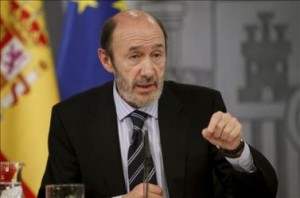
Leading an opposition party during a time of economic crisis should, in theory, be a straightforward job, with none of the worries and responsibility that governing in such times entails. But in Spain, that’s not the case for Alfredo Pérez Rubalcaba, who was chosen to continue heading the Socialist Party earlier this year, despite losing the 2011 general elections.
Rubalcaba is one of Spanish politics’ canniest figures. Critics confer on him the sinister powers of a Rasputin, due to his alleged ability to manipulate issues and people behind the scenes. But his gift for communicating also puts most of his political colleagues in the shade. One television reporter tells of how, when making one particularly big announcement, Rubalcaba managed to “write” the headlines for the story not only for Spain’s TV stations, but also for its radio stations and newspapers with his well chosen words.
So it’s surprising to see Rubalcaba struggling so much at the moment to find a clear and coherent voice in opposition.
“We’re going to oppose everything the government does that is bad for Spaniards,” he said on Wednesday, as he criticised the administration’s handling of the ongoing regional financing drama.
That’s an obvious – almost banally obvious – aim for any opposition politician. But for this particular politician it’s not easy to pull off. Rubalcaba was a key member of the Zapatero government – as interior minister, deputy prime minister and administration spokesman – and he is therefore inextricably linked to its failures to manage the economic crisis.
Since losing the November election in a landslide to Mariano Rajoy and being confirmed as party leader, Rubalcaba has taken a more traditionally social democrat approach to the economy, opposing some of the EU’s tougher conditions and targets for Spain. But with the Partido Popular government still blaming Zapatero for the current mess, Rubalcaba knows he has to tread carefully to avoid looking like a hypocrite. The only solace for him – if it can be called that – is that the Spanish economy has gone from bad to worse under Rajoy.
Diplomacy versus scattergun politics
The other factor constraining the former minister is statesmanship. When the Socialists were in power, many in the Partido Popular gleefully undermined the government and sometimes confidence in the Spanish economy with their opportunistic, scattergun criticism. This genuinely shocked Zapatero, who for all his faults generally avoided such cheap points-scoring. The suggestion was that should the Socialists find themselves in opposition, they would behave more responsibly.
So have they? Rubalcaba and other senior Socialists won’t be winning awards for diplomacy any time soon. But when the party leader speaks in public, his struggle to be statesmanlike and yet also to harvest some political advantage from the economic disaster is almost palpable.
His policy recently has been to offer a united front when it comes to European issues that affect the Spanish economy (earlier this week he performed an interesting variation on this by exhorting the government not to “talk down” its own country’s institutions to other nations), but to be more aggressive against more domestic-related initiatives such as the government’s amnesty for big tax evaders, or its hard line on regional spending caps.
A slide in the polls
The problem for the Socialists is that this careful tightrope walk has not translated into votes.
A poll published at the end of July showed the Socialists to have 24.7 percent of the vote, down from 28.7 percent at the time of the general election. That is despite the fact the Partido Popular suffered a seven-point slide to 30 percent in July.
As the crisis has bitten deeper over the last eight months, it is smaller parties such as UPyD and Izquierda Unida who have benefitted – due in great part to their insistence on bringing those responsible for the banking debacle to justice.
The Socialists, meanwhile, remain tarred with the brush of the Zapatero government and their status as one of the country’s two duopolistic political powers. The passing of time should, in theory, help erase the association in Spaniards’ minds of the Socialists with the economic crisis.
But the 61-year-old Rubalcaba needs to do much more than sit and wait for his polls to start improving. He knows this and at the moment seems to be trying his best to find a convincing voice in opposition. But the best efforts of this seasoned political talent may not be enough.
The socialists ARE to blame for the present mess and, however glib Rubalcaba might appear to the “useful idiots,” they couldn’t muster the intellectual capacity of a concussed gerbil between them. Max another six credit cards, heedless of the interest rates, and we’ll all get rich. After all, you can never have too many Don Quijote Airports!